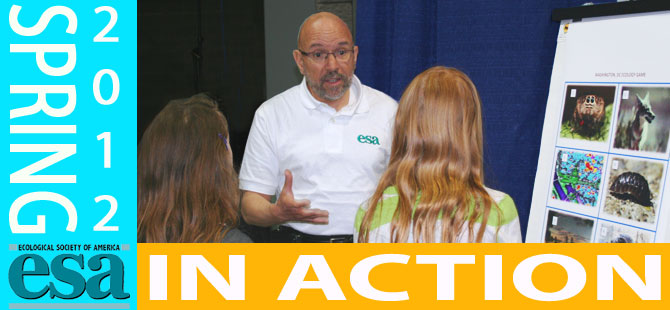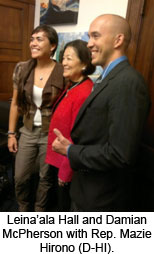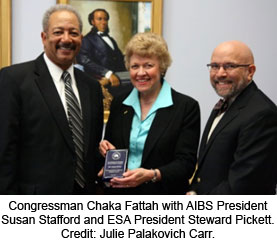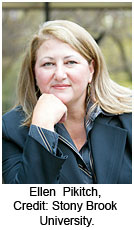
COMMUNITY OUTREACH
ESA at USA Science & Engineering Festival
ESA participated in the April 28 and 29 USA Science and Engineering Festival. Hundreds of people visited ESA’s booth on urban ecology and were particularly drawn to the terrarium of pill bugs, centipedes and other small creatures. Many ESA staff contributed their ideas and time to the effort and President Steward Pickett (in photo, above), with the Cary Institute of Ecosystem Studies, participated in the event both days. Pickett, who also directs the long term ecological research site in Baltimore, Maryland, noted that: “Many people don’t think about ecology in the context of cities. There’s still this notion that you have to go to a national park or other far-away places but, in fact, ecology happens everywhere--in rivers, agricultural fields and heavily developed urban areas.” Pickett and other ESA volunteers enjoyed talking with children from the DC area about ecology and its relevance. Read more on EcoTone or view the photo album.
Aldo Leopold Documentary showing in Northern Virginia
ESA co-sponsored a community event in the DC suburb of Reston, Virginia that featured a showing of the new Aldo Leopold film, Green fire. ESA member Stan Temple (University of Wisconsin, Madison) introduced the film and led the discussion after the showing. Many in the audience had never heard of Leopold and were impressed to learn of his role in shaping U.S. ideas about management of natural resources. Read more about the event on ESA’s blog.
POLICY ENGAGEMENT
Capitol Hill Visits

 In early March, ESA SEEDS students met with their congressional delegations to discuss reauthorization of the Elementary and Secondary Education Act, which includes important science education elements. The groups, compromising nine students and staff from ESA’s Education and Public Affairs offices met with the offices of over 20 Senators and Representatives to request their support for the bipartisan bill introduced by Senate Health Education Labor and Pensions Committee Chairman Tom Harkin (D-IA) and Ranking Member Michael Enzi (R-WY) that takes an all-encompassing approach to advancing science education programs.
In early March, ESA SEEDS students met with their congressional delegations to discuss reauthorization of the Elementary and Secondary Education Act, which includes important science education elements. The groups, compromising nine students and staff from ESA’s Education and Public Affairs offices met with the offices of over 20 Senators and Representatives to request their support for the bipartisan bill introduced by Senate Health Education Labor and Pensions Committee Chairman Tom Harkin (D-IA) and Ranking Member Michael Enzi (R-WY) that takes an all-encompassing approach to advancing science education programs.
 In late March, ESA and the American Institute of Biological Sciences organized the annual Biological Ecological Sciences Coalition (BESC) Congressional Visits Day. Over twenty biologists from across the country participated, visiting over 40 congressional
offices to advocate for continued federal investment in science, particularly through the National Science Foundation. The three ESA Graduate Student Policy Award (GSPA) recipients, along with ESA President Steward Pickett wer
In late March, ESA and the American Institute of Biological Sciences organized the annual Biological Ecological Sciences Coalition (BESC) Congressional Visits Day. Over twenty biologists from across the country participated, visiting over 40 congressional
offices to advocate for continued federal investment in science, particularly through the National Science Foundation. The three ESA Graduate Student Policy Award (GSPA) recipients, along with ESA President Steward Pickett wer e among the participants. Pickett also joined AIBS’ president in presenting Rep. Chaka Fattah (D-PA) with BESC’s award, recognizing the Congressman’s support for the biological sciences. BESC also honored Rep. Frank Wolf (R-VA) with its award, but his schedule would not allow an in-person presentation. The two-day event also included talks by representatives of the White House and NSF, a policy orientation and training and a career panel for all participating graduate students to talk with ecologists working at federal agencies. Photos of the event can be viewed in an album on ESA’s Facebook page.
e among the participants. Pickett also joined AIBS’ president in presenting Rep. Chaka Fattah (D-PA) with BESC’s award, recognizing the Congressman’s support for the biological sciences. BESC also honored Rep. Frank Wolf (R-VA) with its award, but his schedule would not allow an in-person presentation. The two-day event also included talks by representatives of the White House and NSF, a policy orientation and training and a career panel for all participating graduate students to talk with ecologists working at federal agencies. Photos of the event can be viewed in an album on ESA’s Facebook page.
EMERGING ISSUES CONFERENCE
 The second Emerging Issues Conference, “Developing Ecologically-Based Conservation Targets Under Global Change,” was held February 27 – March 1, 2012 at the National Conservation Training Center in Shepherdstown, WV. About 80 scientists, managers, and students convened to discuss conservation issues and develop ideas for relevant products. The final program featured 20 speakers organized into four symposia, breakout discussions focused on product development and a Monday evening keynote address by U.S. Fish & Wildlife Service Director Daniel Ashe. Twenty students and post-docs in attendance were selected from a competitive call for poster abstracts and were offered up to $1000 in travel support from ESA. The conference was supported by the Doris Duke Charitable Foundation, U.S. Fish & Wildlife Service, U.S. Geological Survey, Defenders of Wildlife, and the National Park Service. A PDF of the meeting program can be downloaded here. A reporter with E& E Publishing Service covered the conference in a March 1, 2012 Land Letter piece: “As the ground shifts, conservationists weigh options.”
The second Emerging Issues Conference, “Developing Ecologically-Based Conservation Targets Under Global Change,” was held February 27 – March 1, 2012 at the National Conservation Training Center in Shepherdstown, WV. About 80 scientists, managers, and students convened to discuss conservation issues and develop ideas for relevant products. The final program featured 20 speakers organized into four symposia, breakout discussions focused on product development and a Monday evening keynote address by U.S. Fish & Wildlife Service Director Daniel Ashe. Twenty students and post-docs in attendance were selected from a competitive call for poster abstracts and were offered up to $1000 in travel support from ESA. The conference was supported by the Doris Duke Charitable Foundation, U.S. Fish & Wildlife Service, U.S. Geological Survey, Defenders of Wildlife, and the National Park Service. A PDF of the meeting program can be downloaded here. A reporter with E& E Publishing Service covered the conference in a March 1, 2012 Land Letter piece: “As the ground shifts, conservationists weigh options.”
MEMBERS IN ACTION
 In April, the Lenfest Ocean Program released a report that found small fish are roughly three times as valuable in the sea where they become food for commercially valuable larger species than when they are caught for livestock feed or dietary supplements.Authors of the report included Ecological Society of America (ESA) members MARC MANGEL (University of California, Santa Cruz), TIM ESSINGTON (University of Washington), ROBERT STENECK (University of Maine) and DEE BOERSMA (University of Washington) who also serves on ESA’s Rapid Response Team.
In April, the Lenfest Ocean Program released a report that found small fish are roughly three times as valuable in the sea where they become food for commercially valuable larger species than when they are caught for livestock feed or dietary supplements.Authors of the report included Ecological Society of America (ESA) members MARC MANGEL (University of California, Santa Cruz), TIM ESSINGTON (University of Washington), ROBERT STENECK (University of Maine) and DEE BOERSMA (University of Washington) who also serves on ESA’s Rapid Response Team.
 JOHN DENNIS is Deputy Chief Scientist with the National Park Service (NPS), focusing on guidance for acquisition and management application of applied science. His work involves interdisciplinary teamwork and engages scientists, scholars and managers from across the NPS and other organizations. Topics have included NPS management policies, its Internet-based system for administering park Scientific Research and Collecting Permits, the Department of the Interior’s adaptive management guidance documents, guidance for scientific and scholarly integrity and peer review, the National Vegetation Classification Standard (where ESA is a significant partner), guidance for implementing sharing of benefits from commercial application of research results, observation of response of tundra vegetation to wildfire, policy options for restoring American chestnut to units of the national park system and the use of structured decision making to inform park management regarding options for adapting a rare salamander to climate change.
JOHN DENNIS is Deputy Chief Scientist with the National Park Service (NPS), focusing on guidance for acquisition and management application of applied science. His work involves interdisciplinary teamwork and engages scientists, scholars and managers from across the NPS and other organizations. Topics have included NPS management policies, its Internet-based system for administering park Scientific Research and Collecting Permits, the Department of the Interior’s adaptive management guidance documents, guidance for scientific and scholarly integrity and peer review, the National Vegetation Classification Standard (where ESA is a significant partner), guidance for implementing sharing of benefits from commercial application of research results, observation of response of tundra vegetation to wildfire, policy options for restoring American chestnut to units of the national park system and the use of structured decision making to inform park management regarding options for adapting a rare salamander to climate change.
 COLIN QUINN is a science policy advisor and AAAS Science and Technology Policy Fellow at the National Oceanic and Atmospheric Administration (NOAA). In this role Colin is leading a team to implement NOAA’s Scientific Integrity Policy, which ensures the integrity and prevents political muzzling of NOAA’s science. In addition, Colin is helping lead an interagency writing team to develop a sustainability framework for applying science and technology to decisions that encompass all aspects of sustainability (environmental, social and economic) across the federal government.
COLIN QUINN is a science policy advisor and AAAS Science and Technology Policy Fellow at the National Oceanic and Atmospheric Administration (NOAA). In this role Colin is leading a team to implement NOAA’s Scientific Integrity Policy, which ensures the integrity and prevents political muzzling of NOAA’s science. In addition, Colin is helping lead an interagency writing team to develop a sustainability framework for applying science and technology to decisions that encompass all aspects of sustainability (environmental, social and economic) across the federal government.
|
ESA Policy Section |
MEDIA
Frontiers in Ecology and the Environment has released a new issue examining the importance of dry river beds entitled “When the river runs dry: human and ecological values of dry riverbeds.” Alisha Steward and her colleagues, Daniel von Schiller, Klement Tockner, Jonathan Marshall, and Stuart Bunn highlight the multifaceted benefits of dry river beds, noting that the onset of climate change has increased the need for further research into how they function within ecosystems and human society.
In March, Ecological Applications released a new report outlining research spanning centuries that documents how a once crystal-clear Minnesota lake has been altered to its current murky state. The report documents how human-made infrastructure and agriculture increased algal blooms and altered the ecological make up of Lake Christina. It also highlights the various attempts by local natural resources managers to reduce the nutrients in the lake and balance the different needs of land managers, hunters and recreational anglers that depend on the lake for various resources.
|
ESA's handbook, "An Ecologist's Guidebook to Policy Engagement" is available electronically or as a print copy and will be featured once again during a special session by the Public Affairs Office during ESA’s 2012 Annual Meeting. Released during the 2011 Annual Meeting, the booklet provides advice and resources for engaging with decision makers at various levels of government. It also includes overviews of environmental laws, federal agencies, and tips on effective communication. To order , please go to the ESA eStore. |
|
EcoTone: ESA’s blog EcoTone is currently soliciting guest contributions about citizen science as well as posts highlighting ecology and its connections to policy and society. Contact ESA Communications Officer Liza Lester to learn more about contributing a post: llester@esa.org |